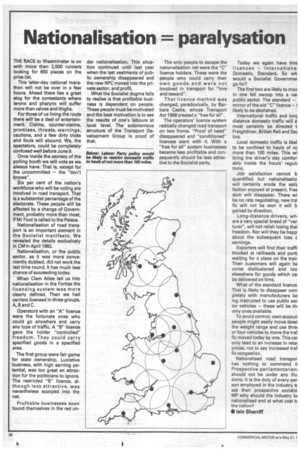Nationalisation paralysation
Page 40

If you've noticed an error in this article please click here to report it so we can fix it.
THE RACE to Westminster is on with more than 2,000 runners looking for 650 places on the prize list.
This latter-day national marathon will not be over in a few hours. Ahead there lies a great slog for the contestants where larynx and pharynx will suffer more than calves and thighs.
For those of us lining the route there will be a deal of entertainment. Claims, counter-claims, promises, threats, warnings, cautions, and a few dirty tricks and fouls will abound. We, the spectators, could be completely confused well before June 9.
Once inside the secrecy of the polling booth we will vote as we always have. That is, except for the uncommitted — the "don't knows".
Six per cent of the nation's workforce who will be voting are involved in road transport. That is a substantial percentage of the electorate. These people will be affected by a change of Government, probably more than most, if Mr Foot is called to the Palace.
Nationalisation of road transport is an important element in the Socialist manifesto. We revealed the details exclusively in CM in April 1982.
Nationalisation, or the public sector, as it was more conveniently dubbed, did not work the last time round. It has much less chance of succeeding today.
When Clem Atlee led us into nationalisation in the Forties the licensing system was more clearly defined. Then we had carriers licensed in three groups, A, B and C.
Operators with an "A" licence were the fortunate ones who could go anywhere and carry any type of traffic. A "B" licence gave the holder "controlled" freedom. They could carry specified goods in a specified area.
The first group were fair game for state ownership. Lucrative business, with high earning potential, was too great an attraction for the politicians to ignore. The restricted "B" licence, although less attractive, was nevertheless scooped into the net.
Profitable businesses soon found themselves in the red un der nationalisation. This situation continued until last year when the last vestments of public ownership disappeared and the new NFC moved into the private sector, and profit.
What the Socialist dogma fails to realise is that profitable business is dependent on people. These people must be motivated and the best motivation is to see the results of one's labours at local level. The autonomous structure of the Transport Development Group is proof of that. The only people to escape the nationalisation net were the "C" licence holders. These were the people who could carry their own goods and were not involved in transport for "hire and reward".
That licence method was changed, paradoxically, by Barbara Castle, whose Transport Act 1968 created a "free for all".
The operators' licence system radically changed road transport on two fronts. "Proof of need" disappeared and "conditioned" licences went with it. With a "free for all" system businesses became less profitable and consequently should be less attractive to the Socialist party. Today we again have thre licences — lnternationa Domestic, Standard. So wh would a Socialist Governmer go for?
The first two are likely to mov in one fell swoop into a ne% public sector. The standard — mirror of the old "C" licence — i likely to be abolished.
International traffic and lonE distance domestic traffic will a most certainly be directed t Freightliner, British Rail and SeE link.
Local domestic traffic is likel to be confined to hauls of nc more than 100 miles. This wi bring the driver's day comfor ably inside the hours' regulz tions.
Job satisfaction cannot b quantified but nationalisatio will certainly erode the satiE faction enjoyed at present. FreE dom will disappear. There wi be no rate negotiating, new tral fic will not be won it will b gained by direction.
Long-distance drivers, wh, are a very special breed of "ver turer", will not relish losing thei freedom. Nor will they be happ about the subsequent loss c earnings.
Exporters will find their traffi blocked at railheads and port: waiting for a place on the trair Their customers will again be come disillusioned and loo elswehere for goods which cai be delivered on time.
What of the standard licence That is likely to disappear corn pletely with manufacturers be ing instructed to use public sec tor vehicles — these will be thr only ones available.
To avoid control, own-accoun people might easily move dowi the weight range and use threi or four vehicles to move the traf fic moved today by one. This car only lead to an increase in retai prices, not to say increased traf fic congestion.
Nationalised road transpor has nothing to commend it Prospective parliamentarian: should not be under any illu sions. It is the duty of every per son employed in the industry tt ask their prospective socialis MP why should the industry bE nationalised and at what cost tc the nation?
• lain Sherriff
























































































































